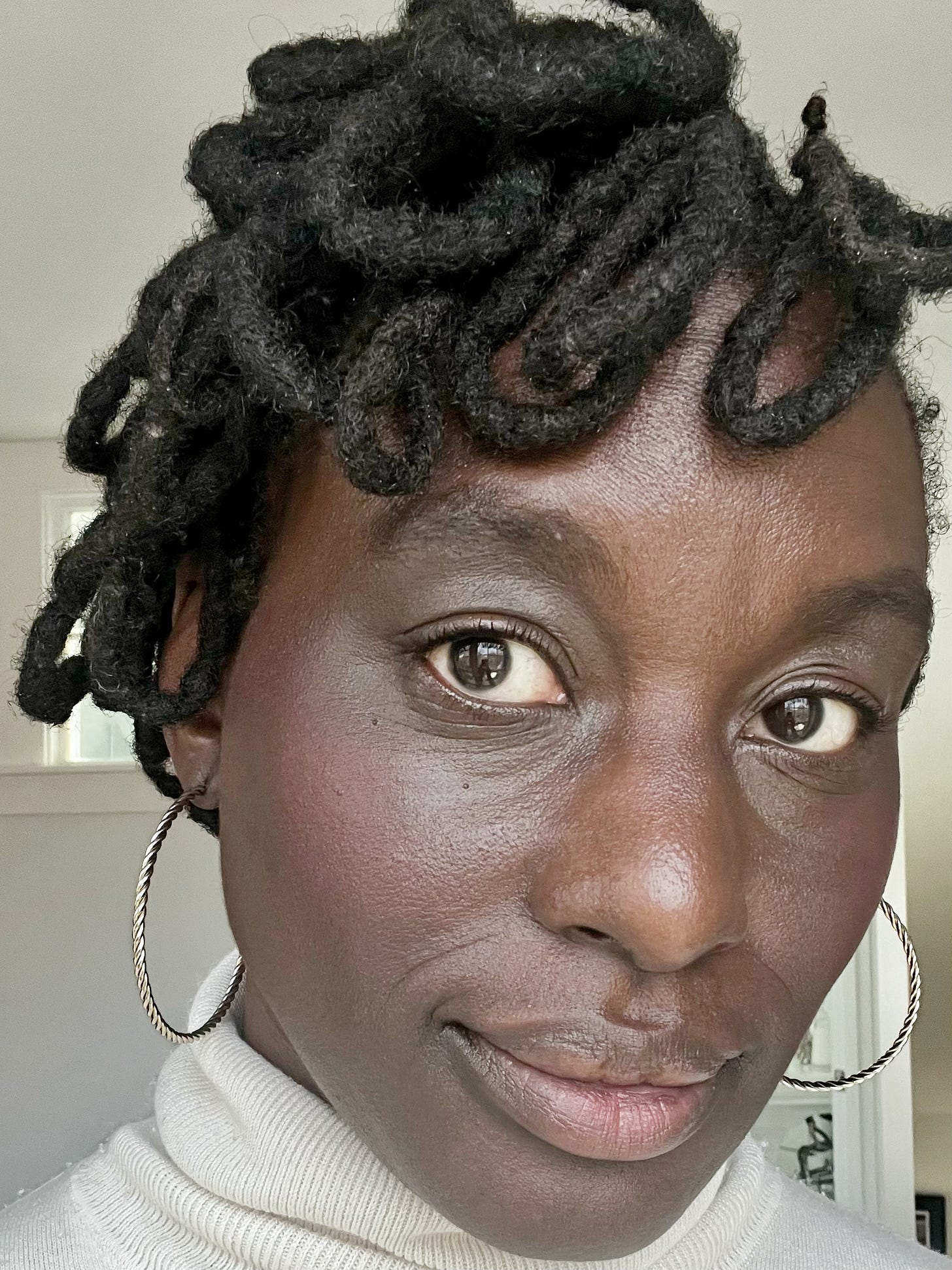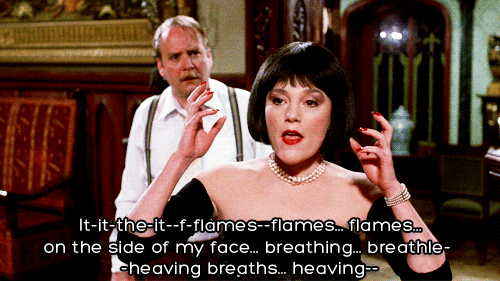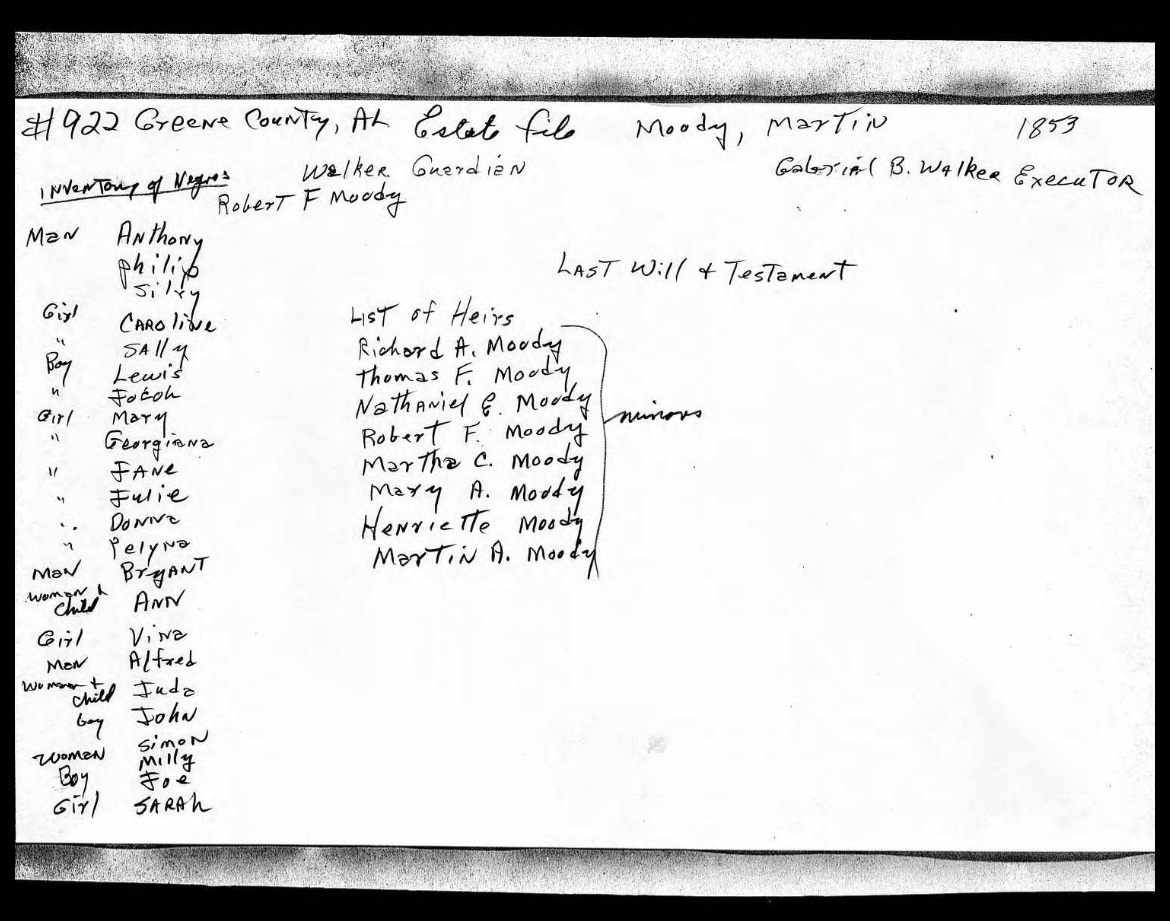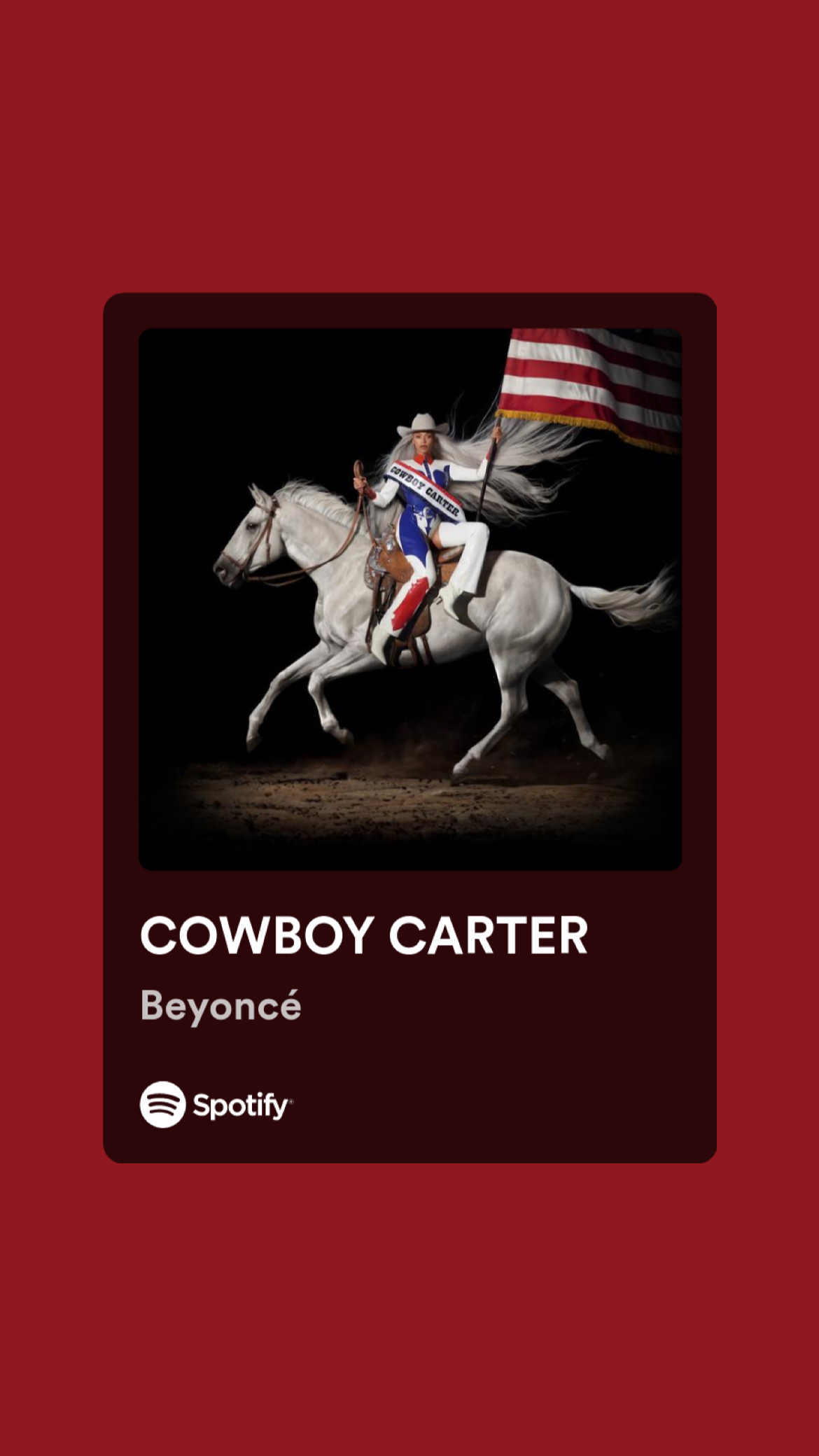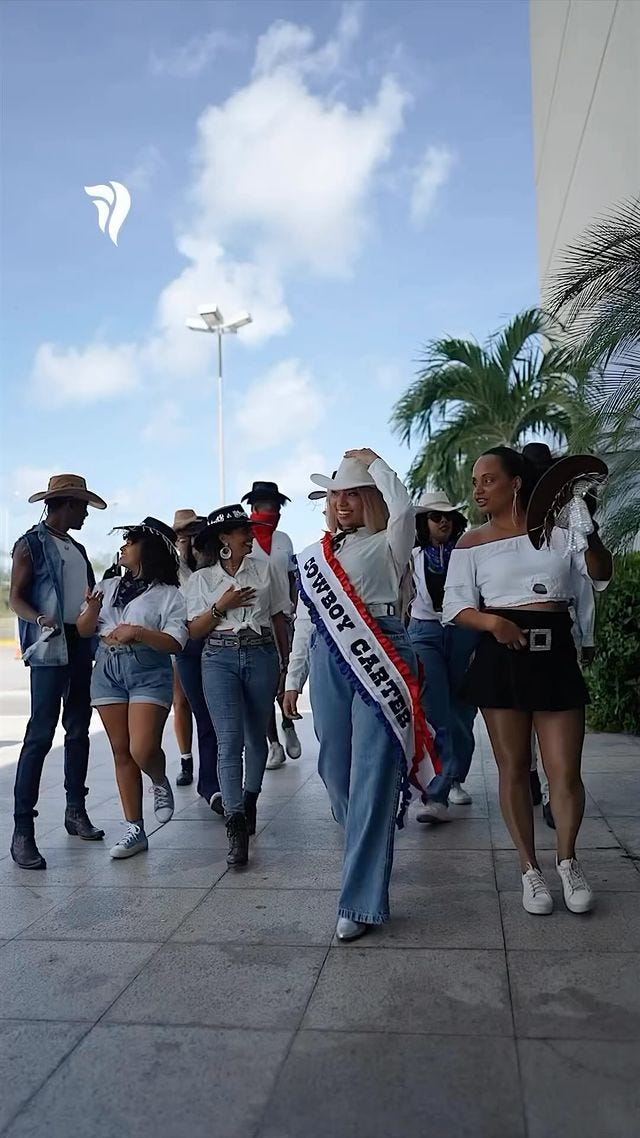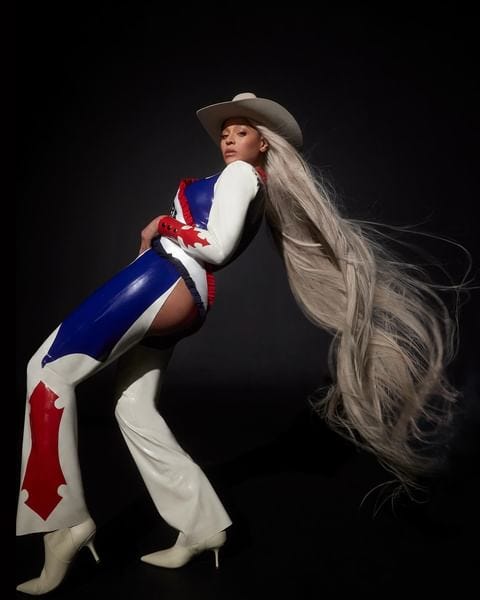First Team All-American
A dream of my missing history on the eve of Beyoncé’s Cowboy Carter release
One of my intentions for 2024 is to give more compliments. I’m not afraid to admit that those moments when I get Gen Z girlies in Y2Kcore see me walking down the street and say “I love your fit!” bring me so much joy. I want to put that same energy back out into the world.
Last month I was sitting in the waiting room before a medical appointment when an older Gen X woman approached me. She crouched down and kneeled on the floor so she could meet my line of sight as I looked down at whatever I was reading on my phone. She told me that I have amazing skin.
It should have been a nice moment between women in an awkward situation, bonding before hearing our names for our turn to be poked and prodded. It might have been if she’d gotten up and walked away. But she wasn’t done with me. She was settled in at my feet, ready for a chat. She introduced herself as Sally1. I braced for impact.
Then she asked me where I was from.
Me: New Jersey
Sally: [something about how she grew up in Bayonne, NJ, and was born in Staten Island but I don’t remember as I was already starting to dissociate]
Me: *blinks*
Sally: But where is your family from?
Me: My parents are from Brooklyn.
Sally: Where is your family from, originally?
Me: My grandparents are from South Carolina and Alabama.
Sally: No, but what is your nationality?
Me: I’m American.
Sally: But your skin is so BEAUTIFUL and so DARK. Where does the darkness come from?
Me:
A few nights ago I had a dream that I saw a man resembling my maternal grandfather. My dream self was so excited to see him, it seemed that he had the answers to a mystery that my family has never solved. The identity of my maternal grandparents. My grandfather was raised in Georgetown, South Carolina by a childless couple who gave him their last name. We don’t know when or how he came to them. His biological brother ended up with another family one street over and another last name.
Both of them dead-ends on my family tree. Family separation in the Jim Crow South was a fact of life. When I was a kid, my grandfather often told me we were descendants of the Waccamaw Tribe. This may or may not be true, but with no knowledge or who his parents were or why they gave him up, it’s the only story he had. Who was I to fact-check? Even if it was only a bit of self-mythology, it was a buffer to keep some distance between us and intergenerational trauma.
In the summer of 2020 when confederate monuments started to fall, I joined Ancestry to do more work on my family tree. My goal was to make sure that the subjects of any of those monuments were not connected to my lineage. I didn’t find connections between any of those marble men on horses and my history, but that was little consolation for the fact that for me, genealogy research means searching not through birth certificates and marriage licenses, but the financial records of enslavers.
My dad’s cousin found this entry from the estate of Martin Moody. Bryant and Ann, my paternal great great great grandparents, are among the “Inventory of Negroes” handed down along with other assets to Moody’s heirs in his 1853 Last Will and Testament. Meanwhile, the Ancestry website is pushing ads suggesting DNA testing that could reveal if I have genetic ties to the white landowners in Greene County, Alabama that inherited my ancestors.
Would that answer Sally’s questions about where the darkness comes from?
Less than 48 hours after I dreamt of my grandfather’s imaginary relative, the Cowboy Carter dropped along with this press release. Just as I have used my clothes to do the talking for me, fellow introverted September Virgo Beyoncé uses the symbolism in her art and communication channels entirely under her exacting control to tell us what’s on her mind. The background provided in the press release alone has the potential to spawn more master’s theses in the humanities and social sciences than an academic year’s worth of graduate seminars. The density of cultural references is astonishing.
And the inspiration further takes into account Southern and Western culture beyond music, the Rodeo, Western films, and the stories of the original cowboys of the West. It was at the Rodeo where she first saw diversity and camaraderie among people who love Country music and an Americana lifestyle, steeped in community, culinary offerings, grills, and Western gear. And it was for everyone. Among the crowds were Black, Hispanic and Native American Cowboys, who made their valuable, authentic allowances to the culture. Their stories are synonymous with American history.
Maybe if my feeds this summer are flooded with images of Black and brown folks line dancing in red, white and blue Western wear, I can go back to the way things weee a decade or so ago, when the sight of an American flag on the back of a truck or the side of a t-shirt sleeve didn’t make my pulse quicken.
The twentieth track on the album, “YaYa,” is a booty-shaking tribute to the kind of songs Tina Turner might have sang in her early days on the Chitlin Circuit. It’s easy to close your eyes and imagine her hair flipping and the fringe on her dress swaying to the beat as she struts across the stage. It sounds like a party, but the lyrics describe a different relationship to the flag’s colors than you would find in the songs that make it past the Nashville gatekeepers of today’s mainstream country radio. Her interpretation, along with the impulse dance through the pain, feels more true to my experience.
My family live and died in America, hm
Good ole USA, shit (Good ole USA)
Whole lotta red in that white and blue, huh
History can't be erased, ooh
Here’s more from the press release.
The music is wrapped around an outpouring of passionate, bold storytelling that captivates the listener with Beyoncé's familiar, powerful voice at the center. Her vocals shine a blinding light on a narrative steeped in truth-telling, revealing hidden histories, and reveling in all the magic you seek when you take an intentional journey back to your roots.
Bryant and Ann Moody were born somewhere on American soil to unknown parents a little over 200 years ago. That was a full century before the wave of immigrants settled in Staten Island and Bayonne, in the shadow of the Statue of Liberty, to work in the shipyards that would bring a better life for the future Sallys of the world. Who never get asked “Where are you really from?” only two generations removed from that answer being somewhere other than the United States.
The lost branches of my family tree were not simply misplaced, they were removed by force. It’s not an accident that we’ve lost the difference in meaning between cowboy and cowhand. Beyoncé’s work is here to correct the record, to make plain that it is impossible to tell the full origin story of American music without including the contributions of Black artists in every single chapter. As the writers from The New York Times Style Desk point out, the fact that she has to do this work at all represents and unequal responsibility.
It’s fascinating, how it’s gotten to the point that Beyoncé seems to believe she has to position herself as a cowgirl on a horse, wearing red, white and blue, holding the American flag on an album cover to drill it into people’s heads that her interest in country isn’t a fad. This is something she cares deeply about, and I can’t think of any other artist at her level who would have to do so much convincing.
This album may already be helping the current community of Black country artists move into a space where their burden of convincing is lessened. Some gaps in bridges to the forgotten legacies of the past are being rebuilt. But there are too many missing pieces that can’t be recovered. My children’s children will continue to have their Americanness questioned. The best I can do is share with them what Beyoncé shares with her children on this album, that wherever they go, history says they belong there.
All the rest…
At the end of last month’s post I gave you some homework do on the racialized history of country music to prepare for this moment. Did you remember to check the syllabus?
Book Club Dropout
Not only did my prediction that Kasey Musgraves might pop up on Cowboy Carter prove incorrect, her album Deeper Well turned out to be way more folk than country. Here’s my favorite track.
Not her real name.





